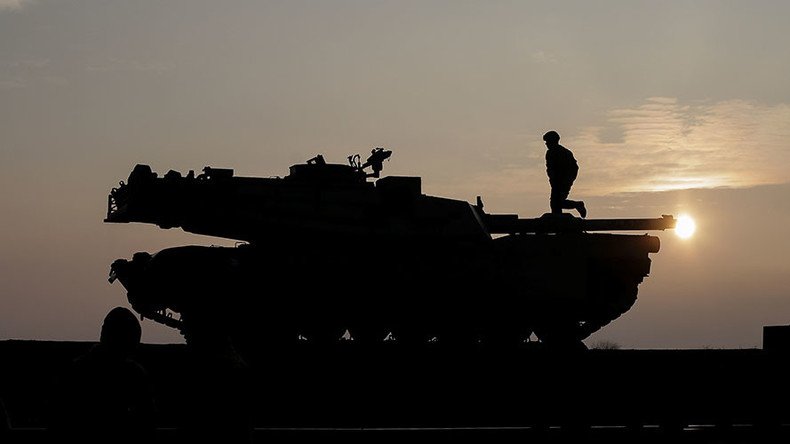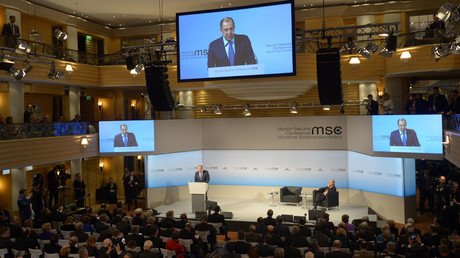US power trip over? ‘Washington overextended itself economically & militarily policing the world’

NATO needs to change its mission and the NATO-Russian Council should be revitalized, said former Pentagon official, Michael Maloof. Defense analyst, Ivan Eland, said Russia would like to know it is not facing a hostile alliance right on its borders.
Russia's Foreign Minister Sergei Lavrov responded to some of the latest accusations against Russia while giving a speech at the Munich Security Conference on Saturday, 18.
Sergei Lavrov also noted that Russia had warned Europe about the issues it's now facing, back in 2007. Mr. Lavrov told journalists that he and his American counterpart have spoken about the future meeting between Vladimir Putin and Donald Trump.
On Friday the US President told a news conference in Washington that he's keen to get along with Russia. However, there are still many differences that could stand in the way of co-operation.
RT: How will Western leaders be feeling about Sergey Lavrov's comments on shifting to a polycentric world? How realistic is it?
Michael Maloof: I think Angela Merkel probably hit the right tone, along with Mr. Lavrov. We are a polycentric world now and the Western influence is probably waning. And it is an indication that, and Mr. Trump has made the point, we need to be working more closely together on a variety of issues, notwithstanding the fact that we have some differences. But I think the tone is good. I think that NATO is going to continue, of course, but they need to change their mission. This is something that Mr. Trump is trying to pursue. It is going take some time. That is in addition to the others paying their fair share.
But I think that we have a larger issue and that is an international terrorism. And Angela Merkel seemed to hit on that - she said that notwithstanding the differences, there needs to be a closer coming together of Russia and the West. I might add that there was a good call for the revitalization of the NATO-Russian Council. And that is something that really needs to be done; we need to be working with the Russians to get that done. I think that is where Trump is coming out ultimately. Notwithstanding the domestic pressures he has right now her here in the US which has a definite anti-Russian flare to it.
RT: Sergei Lavrov spoke about fake news hampering co-operation between countries. To what extent is 'fake news' souring relations between Russia and the West?
MM: It is to the mainstream media’s benefit here in the US, in combination with the liberals and the neocons, to push the worse-case scenario with Russia. I think it is going to be more vital than ever for closer coordination and consultation between Mr. Trump and Mr. Putin directly. To verify things first because the press is out to undermine and there is increasing problems with the fake news. I think that could be overcome. They need to have verification and we need to be working from a basis of fact rather than hysteria.
This idea [of a polycentric world] has come up before. I can remember about 20 years ago Gorbachev was talking about the Europe from Lisbon to Vladivostok and having a common defense policy and security policy. That would make a lot of sense. Because in the present world, the main enemies are not in Europe, the main European countries are not faced by enemies in Europe, they are faced by ISIS outside Europe in the Middle East. So, it will make sense for the Europeans to come together with the Russians and have a common security policy from Cape Finisterre and France right towards through to Vladivostok. - Martin McCauley, author and Russia analyst
RT: US Vice President Mike Pence has accused Russia of redrawing international borders but also says he wants greater cooperation. What do you make of that?
MM: It takes to detangle. The US has been pushing as we saw in the case of Ukraine, in the case of Georgia, in the case of other countries, they are pushing NATO further eastward. Even though it is a defensive organization, it did represent a potential threat to the Russian Federation. That was a bad signal. Under the Obama administration, this is what they wanted to do. They wanted to reassert Western influence. And Mr. Putin objected. I think we need to level that playing field a little more. And I think this is probably where, notwithstanding the fact that Mr. Pence said and Secretary of Defense Mattis are trying to reinforce the US commitment to NATO, I think that ultimately Donald Trump is going to push for closer cooperation with Russia.
‘#NATO should adapt to various challenges like #Russia & #ISIS’ – alliance’s ex-chief #Rasmussen to RT https://t.co/hVxVy4n3kDpic.twitter.com/RKB8YSC3I4
— RT (@RT_com) February 19, 2017
RT: Do you think a polycentric world is realistic?
Ivan Eland, defense analyst: Not with the current tensions between the US and Russia, and also the current tensions between the US and China. But I think the world is becoming more polycentric – the US doesn’t have the dominance it did economically and hasn’t for some time. China is rising, Russia wants to be a regional power and safeguard its borders in the near abroad. I think the world will probably evolve into a more polycentric world simply because the US is overextended in what it is trying to do which is police the world right now.
RT: Sergei Lavrov went on to say that Russophobia is winning over pragmatism in Europe. Do you agree with him?
IE: Yes, and I also think if it were not for Donald Trump, it probably would be winning in the US, too. The media is very anti-Russia here. They don’t understand the Russian security situation over the centuries that they have a very poor intrinsic security with that north-European plain, and they’ve been invaded many times. Russia would like to have some security and know that it is not facing a hostile alliance right on its borders. And NATO has been deaf to that and the US as the leader of NATO has been particularly deaf to this. Any sort of overture of letting in Ukraine drives Russia crazy and with good reason. I think there is just a lack of empathy in the West with Russia’s security situation.
The statements, views and opinions expressed in this column are solely those of the author and do not necessarily represent those of RT.














